“I didn’t know what menopause was” she mentioned in her email to me this week. “Nobody seems to talk about it, especially not my friends.” Having had the same experience when I reached my late-40s, I totally understand her consternation.
That’s why in this article, I’m taking you on a journey through the three phases of menopause and at the end, I hope you can then view my Masterclass on Menopause. Two fabulous hours (you can ‘pause’ me anytime you like too) of information and solutions that all women over the age of 45 yrs need to know.
Menopause is relatively unique to us as a species. And 100 years ago, it might not have been a problem, simply because we didn’t live very long. I often say, menopause is the ‘book-end’ of puberty. It is a time in our life, that refers to the cessation of menstruation, and it is caused by the fluctuation of hormone levels within the ovaries and within women’s bloodstreams. Clinical studies suggest that the average age of cessation is around 48–52 years of age, although women in Western countries end menstruation between their early 40s and late 50s unless there is premature menopause from underlying medical conditions or from the removal of the uterus (hysterectomy) and/or ovaries (oophrectomy).
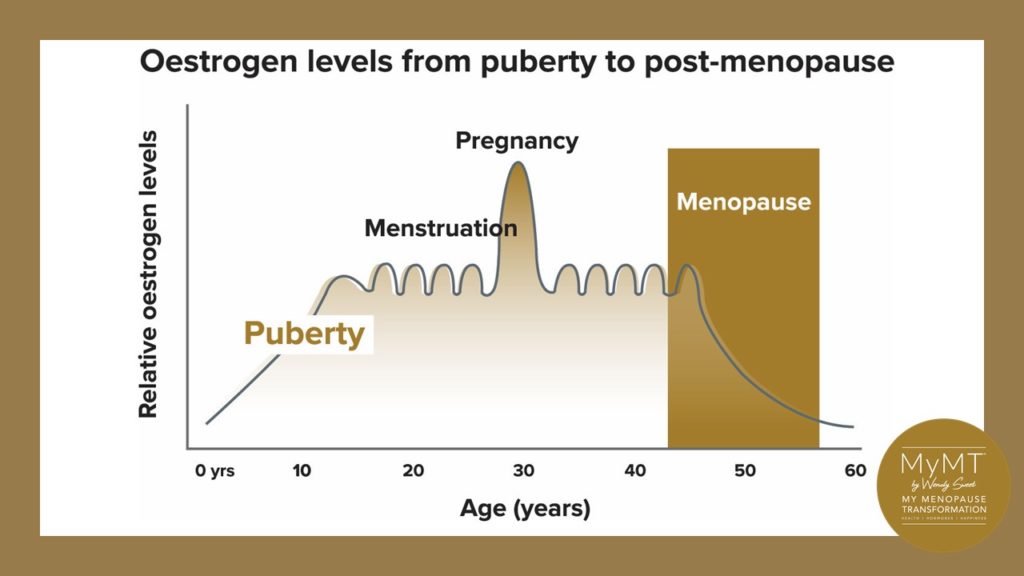
With the possible exception of pilot whales, no mammals studied to date are known to commonly exhibit the cessation of their reproductive capacity as they get older. Except of course, for human females.
Menopause heralds in our biological ageing. From a physiological perspective, we are finishing our reproductive capability and in natural menopause (as opposed to surgical menopause), our ovaries are going into decline. As such, we reduce substantially, our ability to produce oestrogen and progesterone.
There are three distinct phases of menopause.
Phase 1: Peri-menopause. Your periods begin to fluctuate, sometimes becoming irregular, lighter or heavier. Your ovaries are still producing oestrogen, but less of it as your ovarian follicles decline. The key thing to remember here, is that your ‘master reproductive hormones’, Follicle-stimulating Hormone (FSH) and Luteinising Hormone (LH) are still being produced in your pituitary gland. High FSH is associated with a range of symptoms including worsening hot flushes, poor sleep and changing cardiac health.
Phase 2: Menopause. This is when your periods cease and the average age globally is around 51-52 yrs old.
Phase 3: Post-Menopause. When your periods have ceased for a year or more, you are now in post-menopause.
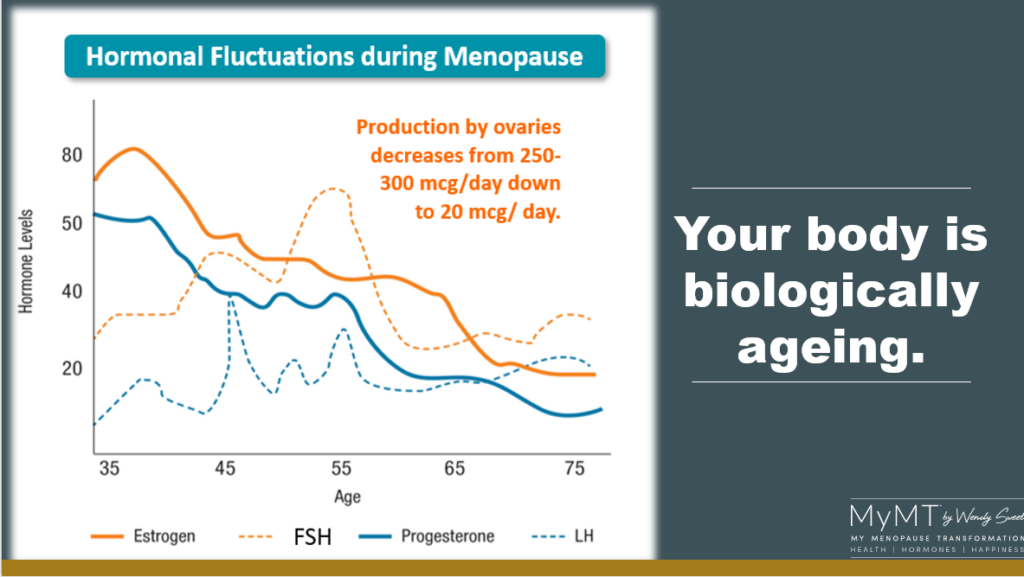
Despite the average age that women enter menopause when menstruation ceases, there is considerable variation and diversity in how women experience their transition towards their biological ageing. It isn’t always about chronological age.
As Heather Dillaway (2006) suggests,
‘Regardless of popular belief, the decrease of estrogen hormones is not the sole cause of menstrual cessation; rather, many hormones fluctuate to cause this reproductive transition or “climacteric”. Some hormone levels increase while others decrease. These hormone fluctuations can occur anywhere from eight to ten years prior to cessation to several years afterwards. What women experience is not just menopause, then, but a complex reproductive transition that can span multiple decades.’
What happens as you biologically age?
Positioning menopause in ageing science was the ‘game-changer’ not only to generate meaning about my own personal experience, but to allow me to follow and adapt the research on women’s health and ageing. You see, our menopause transition heralds in changes all around our body, not just the loss of our reproductive capabilities. I explain why and how this occurs in the Masterclass, but as a summary for you, here’s some of what happens as we age.
- Oestrogen receptors throughout the various organs and tissue structures in the body no longer rely on oestrogen attaching to them. This elicits a number of changes in these structures, e.g. your tendons lose the role of oestrogen causing them to dry out (listen to my video about this on the website on the Joyful Joints link) and many of you may develop conditions such as plantar fasciitis. As well, one of the major changes is that your blood vessels lose elasticity, causing an increase in blood pressure for many of you.
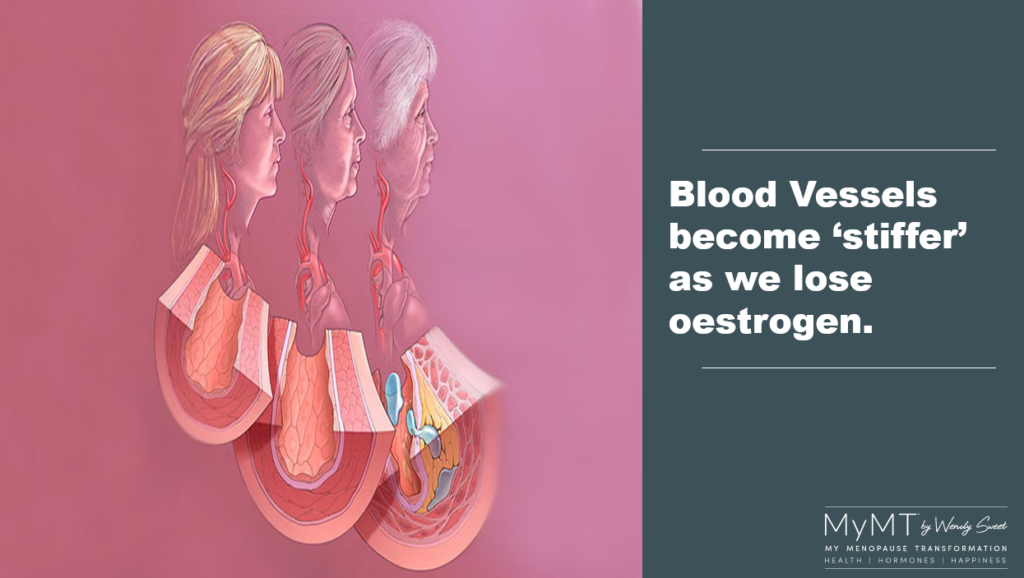
- There is a powerful connection between your changing reproductive hormones and your hypothalamus, pituitary, adrenal and thyroid hormones. This is known as the HPA-Thyroid Axis. For many of you, your symptoms become worse, because of the disruption to these other hormones, because all of your hormones are connected. If you can’t sleep and your hot flushes and anxiety is getting worse, I know how you feel. But as you move through menopause, these other hormones are helping you to ‘survive’ and kick-in to try to re-balance the hormonal environment. That’s why turning around your sleep, stress and thryoid nutrition is part of your solution to resolving your symptoms.
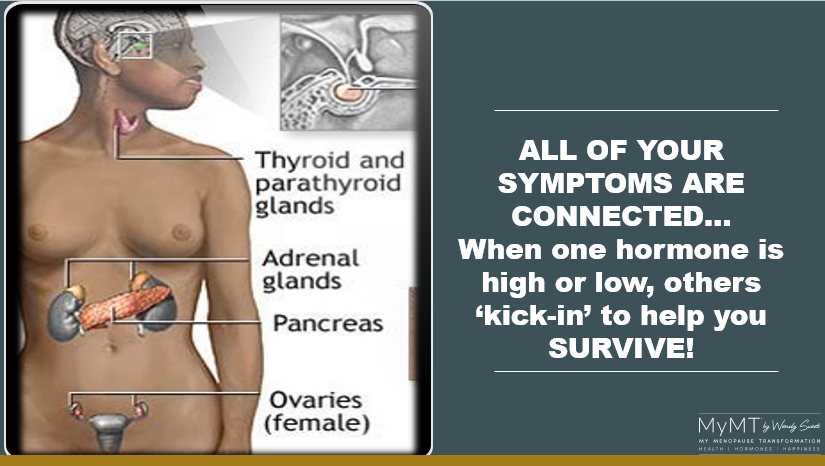
- Ageing is inflammatory. This is known as ‘inflammaging’ and as such, there are changes going on around the body, such as in your muscles, tendons, liver, gut and other organs. The build-up of inflammation in the body not only makes our symptoms worse, but the increased cortisol that arrives from the body trying to reduce inflammation, can leave us lower in progesterone as well. Our chronic sterss hormone called ‘cortisol’ uses up the precious progesterone in the production pathway, hence when inflammation and cortisol is high in women transitioning into and through menopause, this can cause worsening symptoms. As Professor Egger states, “We have been operating in silo’s. We haven’t been taking into account all the other effects on inflammation, including ageing.”
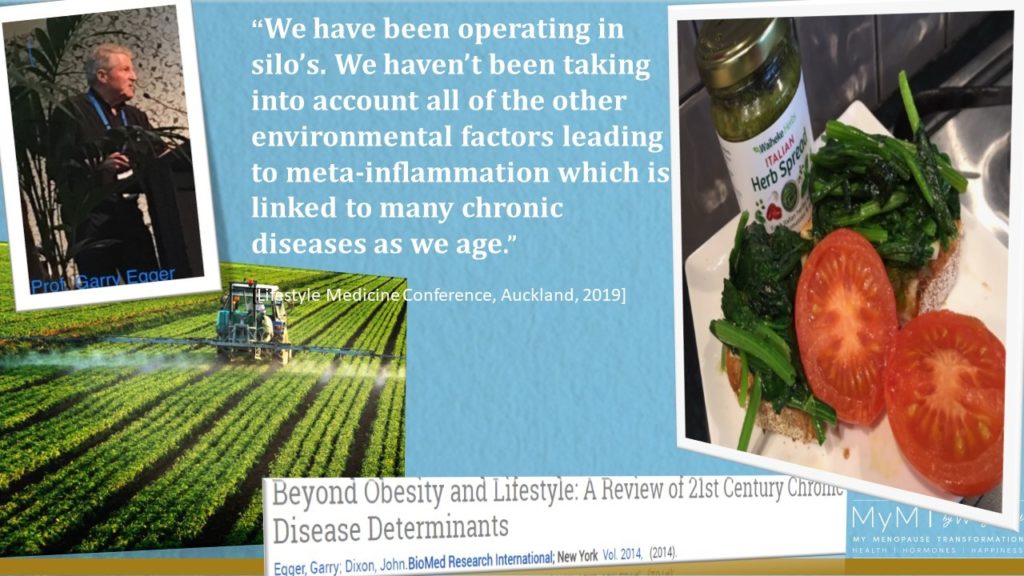
Menopause is derived from the Latin words “meno” which means ‘months’ and “pausia” which means ‘halt’ respectively. But whilst Menopause marks the end of a woman’s period of natural fertility, it doesn’t mean that we can’t feel healthy and happy as we age.
Survival beyond age 65 of a large percentage of the female population is a very recent phenomenon in terms of evolutionary time. Less than 100 years ago, the average life expectancy for women was this age. Herein lies part of the ‘problem’ with menopause. If we are experiencing symptoms that affect our quality of life (and I include weight gain in this too), we need to turn this around in our mid-life transition. Simply because if we don’t, then we may not ‘age-well’.
For example, if we aren’t sleeping or if we are experiencing worsening hot flushes, weight gain, depression and/or joint pain, these concerns may prevent us from staying active and feeling mobile. Paleontologists who study the evolution of menopause report that female hunter-gatherers remain generally active through their late menopause years and are therefore, least likely to be bothered by menopause symptoms. This was evidenced by data on sleep disorders in women from less developed nations as compared with sedentary women in post-industrial countries (Pollycove et al, 2012).
Furthermore, in more recent research, studies into the habits and physical activity patterns of women from the Hadza hunter-gatherer tribe in Africa also found that menopause symptoms (measured as hot flushes and sleep disorders) were low and this was partly attributed to the fact that on average, women walked 6km a day. I talk about this research in the MyMT™ 12 week programmes. It’s an important consideration for women to know ‘how much exercise is enough?’!
In the online Masterclass on Menopause and in my 12 week programmes I talk about our ‘uniqueness’ – with this I mean that we are different from our mother’s generation and we are ‘unique’ in the context of being the first generation of women to enter our menopause transition with so much going on in our lives. Herein also lies some of the ‘problematisation’ of menopause. Our ancient physiology which is heralding in our ageing years, is typically clashing with our modern lifestyle. I explain some solutions to this in my Masterclass – I’ve just added the Introductory video to it below. I hope you can listen sometime and read more about it by following the ‘Learn More‘ link below the video.
For millions of women around the world, their menopause transition throws them into health and symptom chaos. But it doesn’t have to be like this at all. I used to feel so frustrated and despondent until I began to research menopause. When I discovered that it really is the biological gateway to our ageing, and that as we age, we need to understand how to manage and/or reduce inflammation, I explored the women’s healthy ageing research to find out how. The result of this are two different programmes which I called My Menopause Transformation. I hope that one day you might join me and just a reminder that the price has changed to fit in with our changing world at the moment and there is are options for a discount in the Masterclass and on my website for a limited time only.
Dr Wendy Sweet (PhD)/ Member: Australasian Society of Lifestyle Medicine
References:
Arbuckle, K. (2016). Why do women go through menopause? Science offers new solution to old puzzle. The Conversation.
Austad S. (1994). Menopause: an evolutionary perspective. Exp Gerontol. 29(3-4):255‐263.
Dillaway, H. (2006). When does Menopause occur and how long does it last? Wrestling with age and time-based conceptualizations of reproductive aging. NWSA Journal, 18. 31-60.
Lamberts S., van den Beld A., van der Lely A. (1997). The endocrinology of aging. Science, 278(5337), 419-24.
Pollycove R, Naftolin F, Simon JA. The evolutionary origin and significance of menopause. Menopause. 2011;18(3):336‐342.


